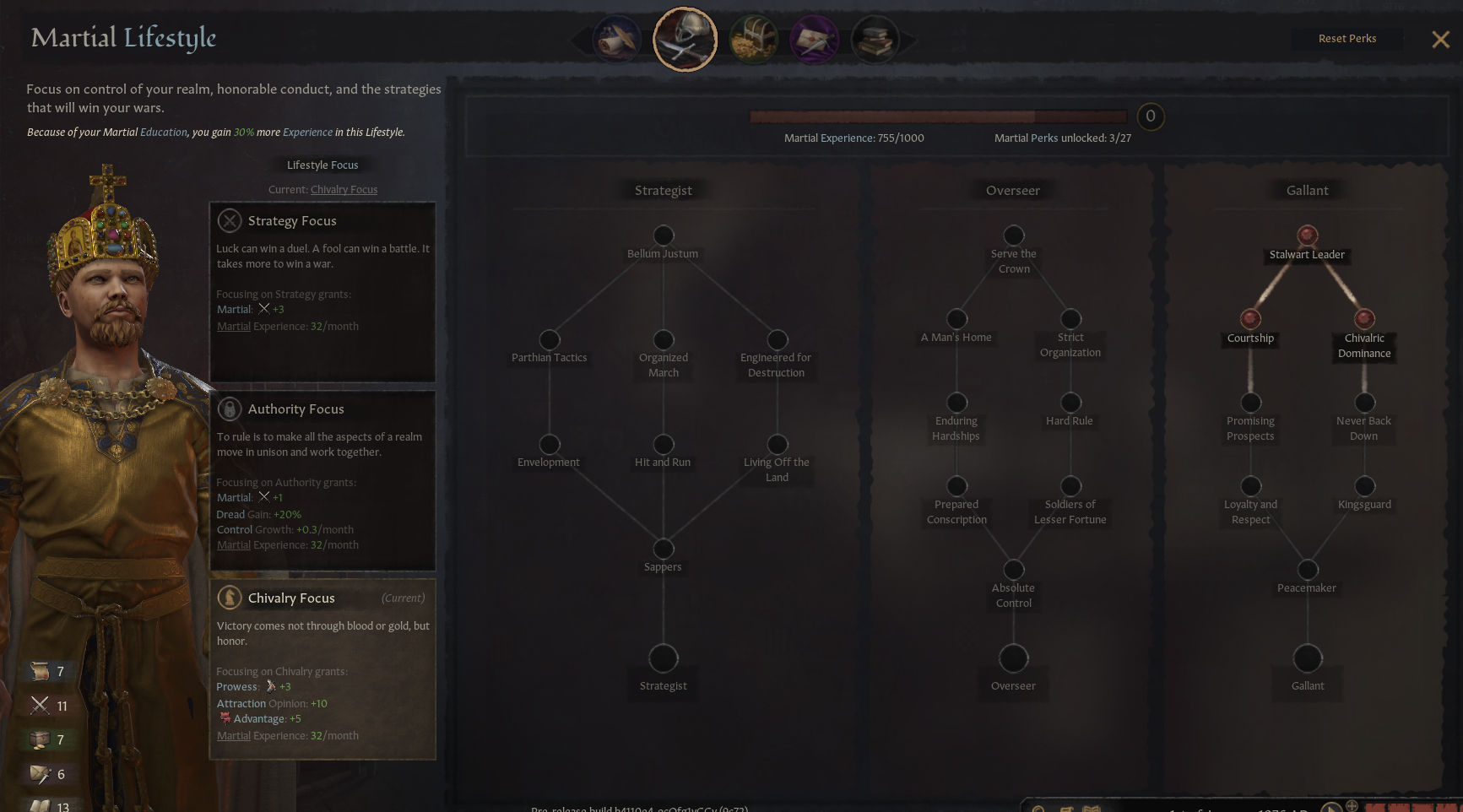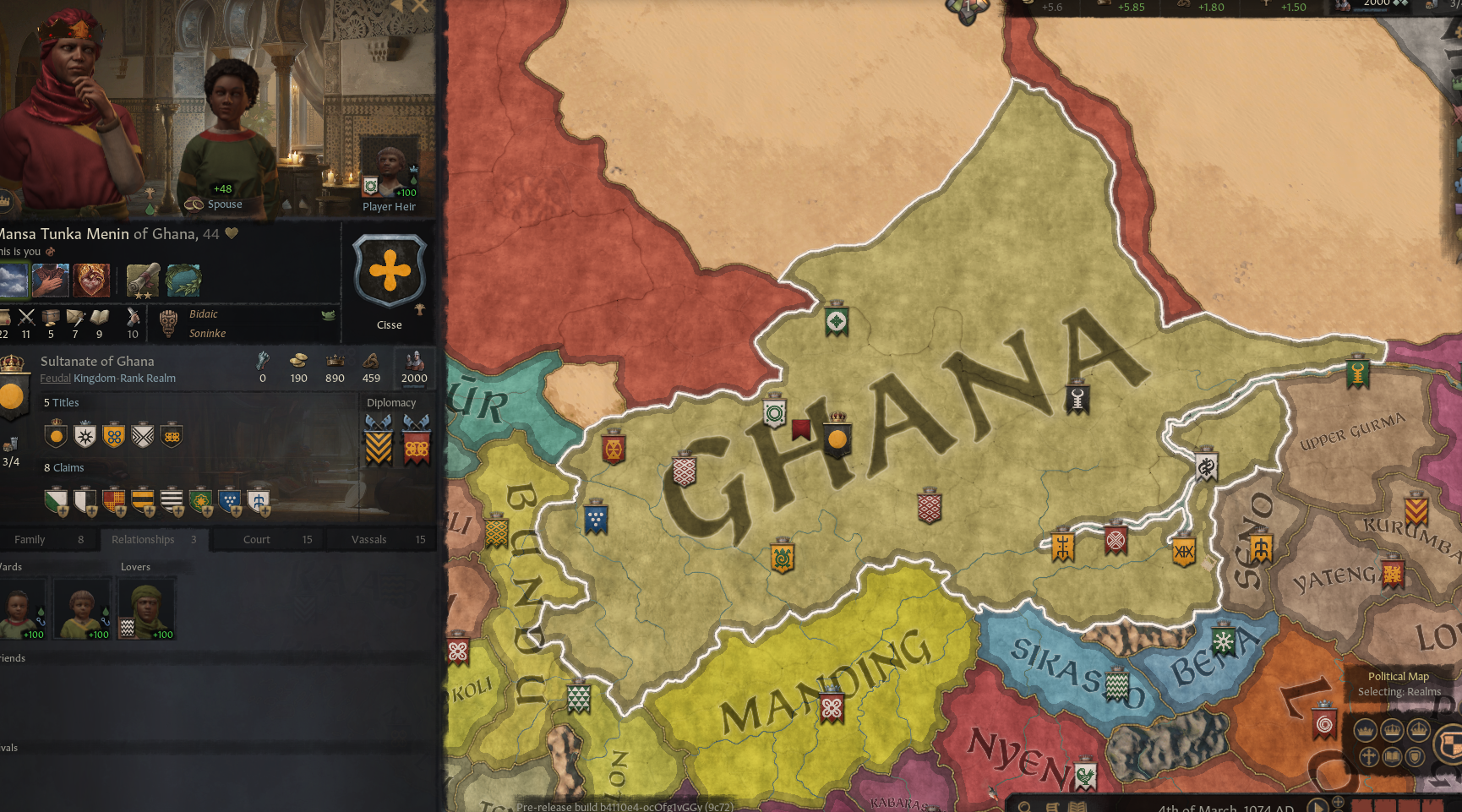Normally when people talk about Crusader Kings, they talk about incest, murder and Glitterhoof the talking horse. When Paradox game director Henrik Fåhraeus described Crusader Kings III, he talked about it as a medieval soap opera, discussing its drama in the way that high schoolers talk about "drama." Crusader Kings III is all about character, he said, but a lot of those characters might fit as comfortably on the CW as they would in a Shakespeare play. It's fitting for a game that works hard to be approachable enough that new players will get to experience the unique joys of this medieval sandbox when it is released on September 1st.
Crusader Kings has become one of those games that's synonymous with being esoteric. This game leans far away from that image.
It didn't take long in my game of Crusader Kings III to reach a moment of jaw dropping drama. I was playing in Ireland, known to fans as "noob island" as it's a little easier to start off there, isolated from the rest of the region. I was trying to make my dynasty the rulers of Ireland, though my first ruler became a eunuch right after his wife gave birth to a son. That son took over the kingdom when his father died, becoming my new character—fundamentally, this is a game about achieving your goals as a player through successive generations of dynastic leadership. When your character dies, you simply play-on as the heir. In this case, my heir inherited much of the island. I had my eye on a particular duchy and was all set up to marry the woman who would inherit it. Months before her 16th birthday, she was murdered—by the same man who had helped me murder her father, ensuring she would inherit it. Turns out that he was next in line after my bride to be. I had him murdered as quickly as possible.
In Crusader Kings III, like the previous game in the series, you can play as almost any historical leader in the beginning of the middle ages. From there, an incredibly complex simulation takes the reins, guiding everyone in the entire European, Eurasian and North African worlds through a chain reaction of alliances, clashes, betrothals and begets. It feels like a pulsing, breathing world, and you have the ability to guide your character and their descendents through any manner of plots. Most people opt for taking over the world, but it's hard enough just to survive.
The way that I like to play Crusader Kings is to take it slowly, to try to gain new territories by inches as my characters are born and die off. Crusader Kings III is built to satisfy multiple different kinds of playstyles, Fåhraeus told me, and it suited mine quite well. New to the series are lifestyle specializations for your player character. A character who has a high martial skill gets a bonus if they take the martial focus, giving them a special boost to their ability to lead a country, an army, or just be authoritarian. One of my favorite rulers was a schemer with an intrigue focus, who gained the ability to create rumors about another character out of thin air. You can change your focus over the course of gameplay as well. Once my long lived martial ruler mastered all skills in those trees, I decided to give him a focus that earned us a little more money. We had such a powerful army that if we raised it for too long, it would bankrupt us eventually.
It's in taking the time to click around and get to know the people in the world of Crusader Kings III that you understand the scale of it. Every single character in the game has their own motivations, their own sources of stress, are making their own schemes. I once changed characters to the leader of Ghana, just out of curiosity. I absorbed some more territories around me as I played, casually, until I got an alert that a scheme had been completed, and a local mayor had become my lover. In Crusader Kings II, you could be gay, but it was presented as a trait you gained over time, instead of the reality of an ingrained sexuality. The king of Ghana was gay, and although he had a wife he was keen to take on a lover.

Crusader Kings has become one of those games that's synonymous with being hard and esoteric, similar to Dwarf Fortress. This game leans about as far away from that image as one possibly can. It's recognizably Crusader Kings, but I don't think most people will need to be obsessively checking a wiki to make sure they know what all the UI elements do, as I still have to do with Crusader Kings II. In speaking to Fåhraeus, it's clear that Crusader Kings developers Paradox Development Studio is hoping to reach a wider audience with this installment. Fåhraeus mentioned Sims players during the presentation Paradox streamed for the press. He said that he'd be happy if more women played, as well.
"We're not quite targeting the casual Sims players," Fåhraeus said. But when I described to him the basic aspect of creating a character in The Sims 4, where you select traits, roleplay their personality, and place them in a world already in progress, Fåhraeus smiled appreciatively.
"I was struck by the parallels there," he said. "The Sims is a sandbox game. You can do whatever you like. The intentions for Crusader Kings III is to give the player much more freedom than II. You can shape the world, you can mold your own character. It's still somewhat challenging, and can be very challenging if you pick a hard starting place or you don't know what you're doing. Things are more forgiving but it's still a sandbox. You have a lot of tools to shape your environments."
"It's very difficult for us in our historical games, because you don't start small."
What immediately struck me is how similar the ways Fåhraeus talks about Crusader Kings III are to the ways that The Sims 4 marketing talked about the game when it launched. That game, too, was all about character, drama, and creating your own story. Fåhraeus said that the audience of those two games are clearly not one-to-one, but there are adult players of The Sims or Civilization that can get a lot of fun out of Crusader Kings III. Fåhraeus hopes that they can find those kinds of people.
"I think it's a much richer world," Fåhraeus said. "It's a living world in Crusader Kings to a different degree than Civ. I mean, I love Civ, but for slightly different reasons, right? You have this sort of gardening experience as you grow the map, you build your roads, that's sort of, it's more relaxing in the sun. You don't have to worry. I just want to bring that over to people who want to play Crusader Kings III as well. It doesn't have to be stressful. You can pause, you're probably not going to get wiped out. There's a little gardening with planning your family, and you can build up your realm with buildings and improvements."
A lot of what has made the game easier to parse is an overhaul to the UI. Crusader Kings III has made a lot of refinements to the tooltips that appear when you hover over a term you don't know, or some part of the interface. Now, however, you can even summon tooltips within tooltips, like clicking around on a wiki. There's also an "issues widget," which is a notification at the top of the screen that tells you basically everything pressing you'll want to know, like whether or not you can press a claim on a territory to start a war, or if you can create a kingdom or duchy. Urgent matters, like the inheritor to your lands being outside of your dynasty, have more pressing alerts. Much of the gameplay feels functionally the same—you still fabricate claims, create schemes, and marry off children to form alliances. You just have to do a lot less clicking around in order to figure out what you should focus on. It's a bit like having a personal assistant to help you play Crusader Kings, a virtual page, if you will.

"It's very difficult for us in our historical games, because you don't start small, you don't start with a single city or, or planets or something," Fåhraeus said. "It's the real world, as the maps were drawn. I hope with our tutorial and our tool tips and our little issues widget and all that, it takes us one step forward at least."
There is a lot that the core fanbase of Crusader Kings II will love about III. Mostly, it's the game that II was, but deeper, better organized, with systems that didn't make a ton of sense reworked. When I spoke to him, Fåhraeus seemed excited about the possibilities of the game finding a new audience as well. He knows that Crusader Kings will always be niche, and he's not exactly expecting the game to overtake Fortnite, but it's clear that he's excited by the possibility of new kinds of players making new kinds of stories with his game.
from VICE https://ift.tt/35WtoPp
via cheap web hosting
No comments:
Post a Comment